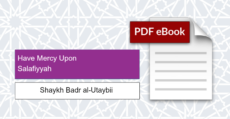Question: How do we distinguish between when it is blameworthy to remain silent about afflictions and when it is praiseworthy to abstain from discussing/delving into them?
Response: [Regarding the issue of] afflictions, [then] none speaks about them other than the people of knowledge and insight; [These are] not [the affairs for] everyone to speak [and voice an opinion] about.
If the ignorant speak [and voice their opinions] about the afflictions, then this [only] increases the afflictions.
If, however, the scholars speak about them and clarify them [for the masses], then indeed with the permission of Allaah they (the afflictions) will be extinguished.
So [the issue of] afflictions are not for everyone to speak [and voice their opinions] about, rather, [those who] speak about them are the people of knowledge and the people of [sharee’ah-based] insight; Those who are able to distinguish the truth from the falsehood, and know [full well] how to speak [about such serious matters].
[The issue of] afflictions is not for everyone to delve into and speak about and [then] issue Islaamic rulings [based upon ignorance] and say [such and such], yes.
إذا تكلم الجهال في الفتن زادت الفتن
السؤال: كيف نفرق بين السكوت عن الفتن المذموم وبين عدم الخوض فيها المحمود؟
الجواب: الفتن لا يتكلم فيها الا أهل العلم والبصيرة، ما الكل يتكلم فيها.
إذا تكلم الجهال في الفتن زادت الفتن؛ أما إذا تكلم العلماء فيها وبينوها فإنها تطفأ بإذن الله.
فالفتن ما يتكلم فيها كل أحد وإنما يتكلم فيها أهل العلم وأهل البصيرة الذين يعرفون الحق من الباطل ويعرفون كيف يتكلمون.
ما يخوض كل واحد في الفتن ويتكلم ويفتي ويقول…نعم.



